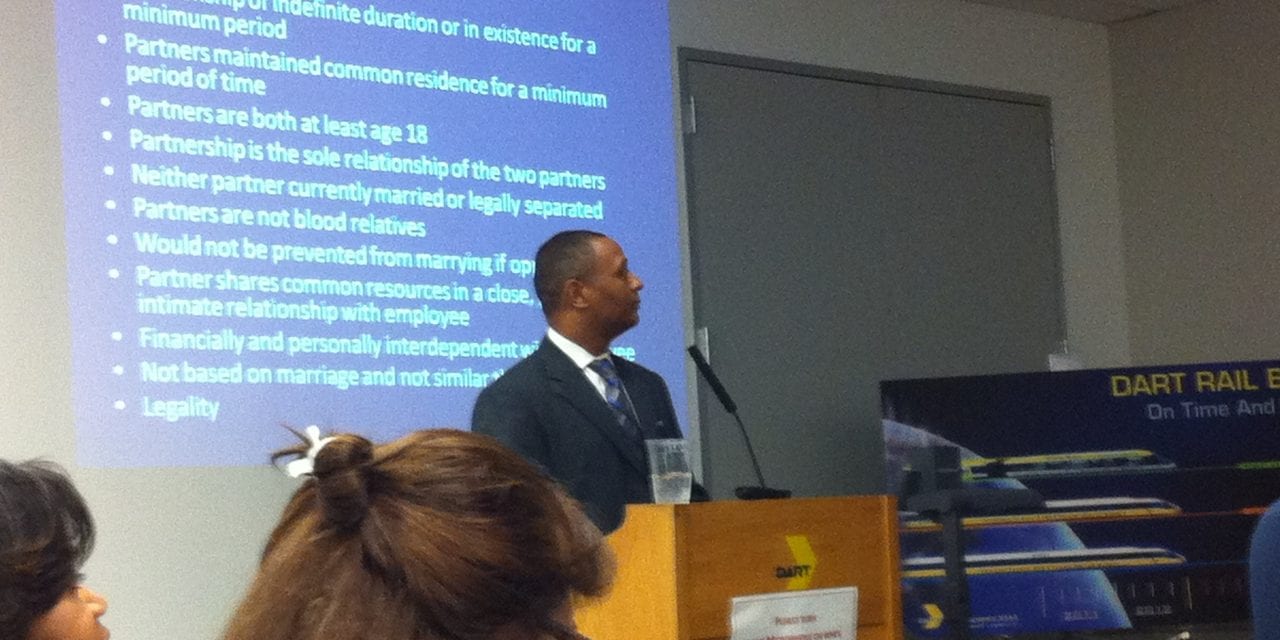
Michael Muhammad, DART’s interim vice president of diversity, presents a potential DP benefits plan for DART employees at an administrative committee meeting on Tuesday. (Anna Waugh/Dallas Voice)
A DART committee is taking its time in studying a proposal to offer domestic partner benefits to the transit agency’s employees.
Members of DART’s administrative committee requested several sample plans complete with costs and definitions Tuesday.
After delaying a briefing on domestic partner benefits last month due to time, Michael Muhammad, DART’s interim vice president of diversity, recapped his previous presentation about other Texas governmental entities that offer the benefits, as well as Texas law that prohibits the recognition of anything identical or similar to marriage.
He said DART’s plan would include proving that applicants are in a committed relationship and share household responsibilities, and are 18 or older and unmarried. He suggested making the benefits open to blood relatives, which all other Texas plans prohibit.
Muhammad brought up Attorney General Greg Abbott’s expected opinion on DP benefits, which was requested by state Sen. Dan Patrick, R-Houston, in early November. He also said the city of El Paso’s benefits have been “legally challenged” and said it was ongoing. El Paso City Council approved the benefits in 2009 and again in 2011 after a repeal effort led by anti-gay Pastor Tom Brown overturned the council’s decision. Brown appealed the case to the Texas Supreme Court in March, but it’s unlikely the court will hear the case. Meanwhile, city employees have DP benefits.
He said the requirements for domestic partners could be as broad or as narrow as the committee wanted, suggesting that the broader the requirements are, the less likely they are to be legally challenged.
The number of unmarried DART employees was again asked for, as it was in October. Muhammad didn’t have that information, but said the estimated cost to DART for the benefits was $105,000 to $210,000, which is an average cost generated from a DART consultant. Still, he said the cost would be minimal.
John Danish, DART’s board chair and an Irving appointee, attended Tuesday’s meeting. He brought up the possibility of offering the benefits to blood relatives, using the example of a widow who lives with her son and two brothers who live together and share household duties being eligible for the health benefits.
Danish said common law marriage already protects opposite-sex couples who are in committed relationships. He later asked a DART attorney in the meeting to clarify how DART would define marriage for DP benefits purposes, but committee chair Jerry Christian requested that the committee go into executive session for that to be answered.
DART was criticized by LGBT advocates in 2010 after it made decisions in an executive session about its nondiscrimination policy and quickly voted on changes after the session.
The committee remained in executive session for 15 minutes Tuesday as board members consulted with the attorney on legal issues. They then returned to open session and requested Human Resources provide the committee with several specific plans, including definitions and costs for those plans.
The committee will be briefed on those plans at its Jan. 8 meeting. DART spokesman Morgan Lyons said it is possible the committee may make a recommendation after hearing the plans and could vote on a plan at its February meeting. He said the committee could also request further information.
LGBT advocates who attended Tuesday’s committee meeting included GetEQUAL activist Cd Kirven and Resource Center Dallas’ Rafael McDonnell.











